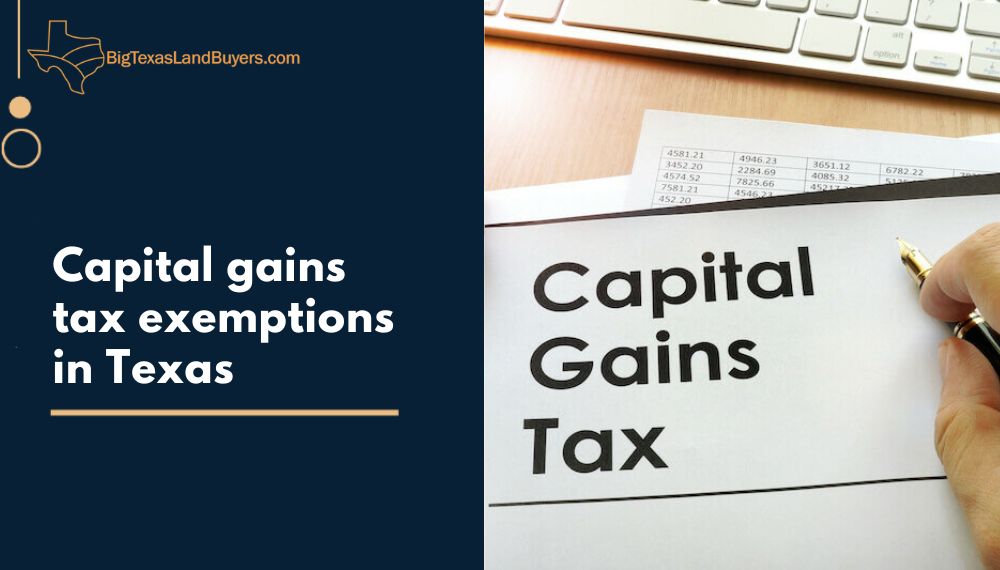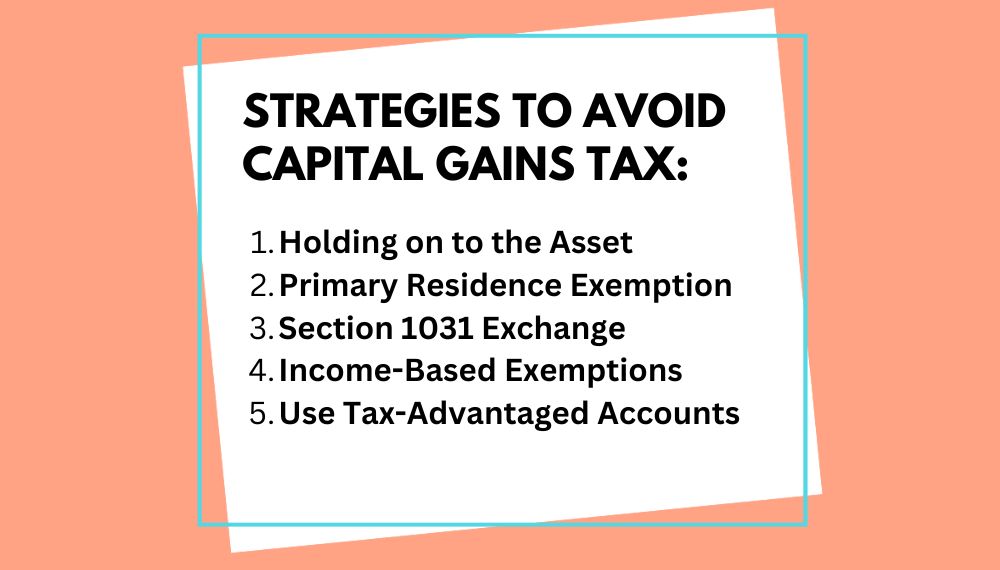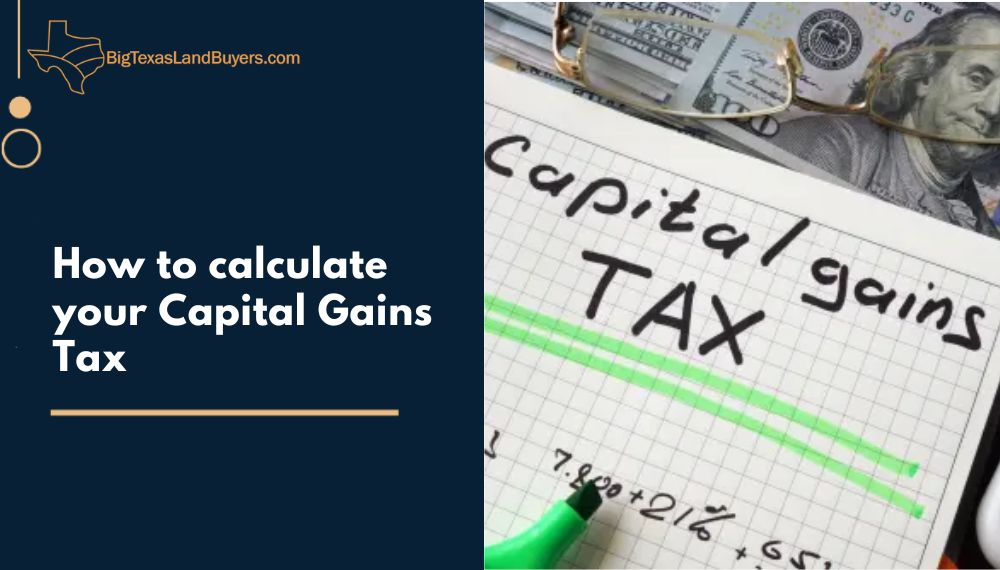When it comes to selling land in Texas, understanding how to navigate capital gain taxes is crucial. Nobody wants to pay more in taxes than necessary, so being informed about the potential tax liabilities and strategies to minimize them is essential.
This article will cover everything you need to know about capital gains taxes on selling land in Texas and provide tips on how to avoid or reduce them.
What taxes are charged when selling land in Texas?

When selling land in Texas, you won’t have to worry about state income taxes, as Texas does not have a state income tax. However, you may still be subject to federal capital gains taxes. The amount of capital gains tax you’ll owe depends on the profit you make from the sale, how long you’ve owned the property, and your tax bracket.
Understanding capital gains taxes
Capital gains taxes are imposed by the IRS when you sell an asset, such as land, for a profit. The capital gain is the difference between the selling price and the original purchase price of the asset. For example, if you bought a piece of land for $50,000 and sell it for $60,000, you would have a $10,000 capital gain that may be subject to taxes.
Federal Capital Gains Taxes vs. Texas State Tax Laws
Before making any decisions about selling land in Texas, residents in Texas must understand the distinctions between federal and state capital gains taxes. In contrast to the majority of states, which tax capital gains similarly to ordinary income, Texas does not charge a special tax on this kind of gain.
Making informed decisions on one’s overall capital gains tax strategy and how to effectively handle future liabilities can be facilitated by having a thorough understanding of these distinctions.
Differentiating short-term and long-term capital gains tax rates
Capital gains taxes are categorized into short-term and long-term capital gains based on how long you’ve held the asset before selling it. The tax rates for short-term gains range from 10% to 37%, depending on your income level. For long-term gains held for more than a year, the rates are 0%, 15%, or 20%, depending on your income level and filing status. By understanding these rates, you can strategize to minimize your capital gains tax liability.
Capital gains tax exemptions in Texas

There are two types of exemption from paying capital gains taxes:
Income:
Ordinary income must reach a certain level in order for capital gains to occur. You will not be required to pay capital gains taxes if your taxable income is less than this amount. The table below shows the income levels applicable to the 0% long-term capital gains rate.
Primary residence:
You may be eligible for an exemption if the property served as your primary residence for two of the previous five years. This might not apply if you’re selling land in Texas, but it might if you’re selling a house with a lot of land. If you meet the requirements, the first $250,000 of capital gains (or $500,000 if you’re married) is exempt from taxes. Please refer to IRS rules as there are various more criteria.
Strategies to avoid capital gains tax

Holding on to the Asset
One effective strategy to minimize or avoid federal capital gains tax is to hold on to the asset for a longer period.
By holding the asset for more than one year before selling, you qualify for long-term capital gains tax rates, which are significantly lower depending on your income level. This approach can help you reduce the tax burden associated with selling land in Texas and maximize your profits.
Primary Residence Exemption
For homeowners looking to sell their primary residence, the Primary Residence Exemption is a valuable tax strategy. Single homeowners can exclude up to $250,000 of the profit from the sale of their primary residence from capital gains tax, and this exclusion doubles to $500,000 for married couples filing jointly.
By meeting the residency requirements and utilizing this exemption, homeowners can minimize the impact of federal capital gains tax when selling their primary residence.
Section 1031 Exchange
While Texas does not have a state capital gains tax on real estate, investors can still take advantage of a Section 1031 exchange to defer paying federal capital gains tax on investment properties.
This tax strategy allows investors to reinvest proceeds from the sale of one property into another ‘like-kind property,’ effectively deferring capital gains taxes. By leveraging the benefits of a 1031 exchange, investors can grow their portfolios, enhance investment returns, and build long-term wealth.
Income-Based Exemptions
Income-based exemptions can provide significant relief for taxpayers within certain income brackets, allowing them to strategically sell assets to minimize or eliminate federal capital gains tax liability.
Retirees and individuals with lower income levels can take advantage of these exemptions by timing asset sales to fall within lower-income years. For high-income individuals, strategic planning and consultation with a tax advisor can help maximize the benefits of income-based exemptions and minimize the impact of capital gains tax.
Use Tax-Advantaged Accounts
Investing in tax-advantaged accounts such as HSAs, DAFs, 529 college savings accounts, 401(k) plans, and IRAs can help minimize the impact of federal capital gains tax.
These accounts provide substantial tax advantages, such as possible exclusions from capital gains taxes on investments made inside of them. Through the utilization of tax-advantaged accounts, investors can maximize their investment returns, minimize their overall tax burden, and optimize their tax strategy.
By employing these strategies, you can minimize or eliminate capital gains tax liabilities on the sale of land in Texas, helping you retain more of your profits.
How to calculate your Capital Gains Tax

You can still be liable for federal capital gains tax on your investments even though Texas does not have a state capital gains tax. This can be computed by deducting the selling price from the asset’s cost basis, which is the acquisition price plus any applicable fees. You will then receive the entire return on your investment. After that, you can determine your tax obligation by applying the appropriate long-term or short-term capital gains tax rate.
When selling most primary residences, other assets, including investments made inside a tax-advantaged account, a similar calculation applies, accounting for any relevant exemptions or exclusions covered above. Though there are some situations in which subtlety could be relevant.
You may be able to write off or carry forward a loss if you sell below your cost basis in order to save money on taxes in the future.
Long-term capital gains tax rates in 2024
| Filing Status | 0% Rate | 15% Rate | 20% Rate |
| Single | Up to $47,025 | $47,026 – $518,900 | Over $518,900 |
| Married filing jointly | Up to $94,050 | $94,051 – $583,750 | Over $583,750 |
| Married filing separately | Up to $47,025 | $47,026 – $291,850 | Over $291,850 |
| Head of household | Up to $63,000 | $63,001 – $551,350 | Over $551,350 |
Calculating capital gains tax on inherited property
In Texas, estate tax and capital gains tax are separate entities but can intersect when it comes to inherited assets. When someone inherits property, the cost basis is typically “stepped up” to the fair market value at the time of the owner’s death. This implies that the capital gains tax that is applied when the successor sells the property in the future will be determined by the gain from the stepped-up value rather than the initial purchase price.
The heir’s capital gains tax obligation may be greatly decreased by this increase in the base rule. It’s crucial to remember, though, that if an estate exceeds the exemption level, estate tax is applied to the fair market value of the decedent’s estate at the time of death. Consulting with a tax advisor or estate planning attorney can help you understand how these taxes may affect your situation.
Capital gains tax on Texas property sales
When selling land in Texas, it’s essential to calculate the capital gains tax accurately. The process involves determining the cost basis of the property, which includes the purchase price, improvements made to the property, fees, and closing costs. By subtracting the cost basis from the selling price, you can determine your capital gain.
The next step is to apply long-term or short-term capital gains tax rates based on how long you’ve held the property. If the property has been held for more than a year, long-term capital gains tax rates apply, which are typically more favorable. On the other hand, if the property has been held for less than a year, short-term capital gains tax rates, aligning with ordinary income tax rates, will be applicable.
Selling Land in Texas: FAQs
- How much capital gains tax will I pay in Texas?
There is no state capital gains tax to be paid in Texas. Capital gains taxes must be paid to the federal government at varying rates based on the kind and volume of your income. The rates may vary based on your income band, from 0% to 15% to 20%. When selling land in Texas, it’s crucial to speak with a tax expert to find out the precise amount you might be required to pay.
- Do I have to pay capital gains tax when I sell my house in Texas?
When selling your house in Texas, you may be subject to capital gains tax at the federal level. However, there are various exemptions and strategies available that can help you reduce or even eliminate this tax burden. By taking advantage of these options, you can potentially save thousands of dollars in taxes when selling your property.
- What is the capital gains tax on $500,000?
The taxation rate of capital gains on $500,000 follows the 2022 thresholds set by the federal government. It’s crucial to consider this rate when calculating the taxable amount of any given transaction. By understanding how much tax you may owe on a $500,000 gain, you can better plan for your financial future and take steps to minimize your tax liability.
- What is the difference between short-term and long-term capital gains tax?
The taxation of capital gains in Texas varies based on the duration of ownership. Short-term capital gains tax applies to properties sold within a year at the individual’s income tax bracket rate, while long-term capital gains tax applies to properties held for over a year, with rates determined by the filer’s status. By understanding these differences, you can plan your transactions to optimize your tax situation.
- How can I reduce my capital gains tax liability in Texas?
To reduce your capital gains tax liability when selling land in Texas, consider adopting strategies such as long-term investing, utilizing accounts with tax advantages, and employing tax-loss harvesting techniques. By strategically planning your transactions and taking advantage of available tax-saving opportunities, you can minimize the amount of tax you owe and keep more of your profits.
Conclusion:
In conclusion, navigating capital gains taxes on selling land in Texas requires careful planning and understanding of the various exemptions and strategies available. By taking advantage of these options, property owners can minimize or even eliminate their tax liabilities when selling land in Texas. Stay informed and seek professional advice to ensure you make the most of your land sale without paying more in taxes than necessary.

